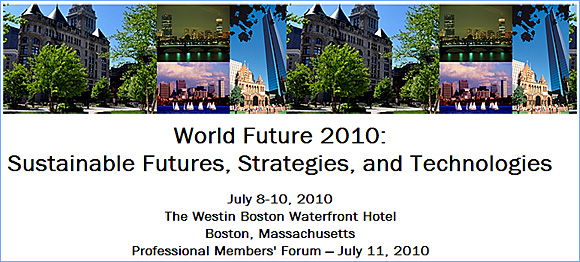We are now at a point where we must educate our children in what no one knew yesterday, and prepare our schools for what no one knows yet.
— Margaret Mead, one of the World Future Society’s early supporters
“The seismic financial shifts of the past 36 months are accelerating many long-term changes that have been gaining momentum over the last 20 years. This year’s Summit examines emergent forces of change in education, whose adoption rates will be dramatically increased by the demographic realities and economic necessities of the decade ahead.” (emphasis DSC)
— David Pearce Snyder, consulting futurist, Snyder Family Enterprise; author of numerous books on future trends; Bethesda, Maryland
New Paradigm View of Education — by Jerry Fluellen, adjunct professor, Psychology and Education, Edward Waters College, Jacksonville, Florida
Since its early development, the power teaching prototype (P=fm) has evolved to connect a set of factors: Ellen Langer’s mindful learning, Harvard Project methods for designing and delivering instruction, information literacy, and Howard Gardner’s five minds for the future. These factors interact to create a new paradigm approach featuring research-based practices and fostering practice-based research.
Fostering 21st-Century Skills through Problem Solving International — by Marianne Solomon, executive director, Future Problem Solving Program International, Inc., Melbourne, Florida and Vicki Stein, program director, Future Problem Solving Program International, Inc., Melbourne, Florida
(Includes students from the Boston area to discuss their projects) Learn about a program that utilizes creative problem solving, encourages students to research and analyze global issues of the present and the future, and provides the materials/tools for collaborative team work. The program also extends learning through the service learning component, Community Problem Solving, and the creative writing component, Scenario Writing, which is based 20–30 years into the future.
Levers of Change in Higher Education — by Maria H. Andersen, Math Faculty, Muskegon Community College, Greater Grand Rapids, Michigan
We’ve seen many major industries undergo dramatic change in the last decade (e.g., manufacturing, newspapers, and customer service). While education seems “untouchable” to those within the system, there are many “levers of change” that have the potential for dramatic restructuring of higher education as well. Online courses, adaptive computer assessment systems, open-source textbooks, edupunks, pay-by-the-month degrees—these are just some of the levers that are prying at the corners of higher education. In this presentation, I will identify many of the levers of change that have the potential to shift higher education, resources to learn more about these, and a few scenarios that describe some of the possible futures of higher education.
Integrative Futures Education at the College Level — by Tom Lombardo, faculty director of the PASS Program at Rio Salado College, Director of the Center for Future Consciousness, Tempe, Arizona
Futures education provides the ideal framework for providing college students with a high quality integrative and holistic education. I will describe the evolution of such an educational program at Rio Salado College in Tempe, Arizona. Many lines of thought and diverse themes, often a result of work I have done within the Center for Future Consciousness, have contributed to the development, organization, and focus of this program. I will highlight some of these features of the program, including the enhancement of future consciousness, character virtues and wisdom, deep learning and higher cognitive skills, sustainability and environmental ethics, and the synthesis of the humanities, sciences, and technology.
The Robot in the Classroom — by Thomas P. Abeles, president Sagacity, Inc., Minneapolis, Minnesota
On which side of the lectern will we find the robot in the classroom? What classroom? The rise of increasingly powerful computers,—“fast adders”—requires that both human and computer intelligence depend on heuristics, demanding that both acquire a strong moral compass. Can these “fast adders,” Star Trek’s Data, develop the sensibilities of a Captain Kirk without the aberrant behavior of “The Borg”?









